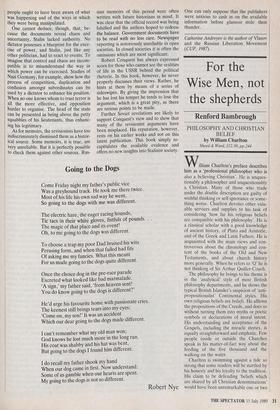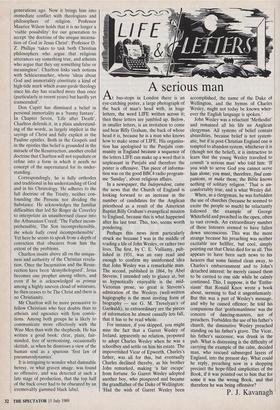For the Wise Men, not the shepherds
Renford Bambrough
PHILOSOPHY AND CHRISTIAN BELIEF by William Charlton
Sheed & Ward, £12.50, pp•244
William Charlton's preface describes him as a 'professional philosopher who is also a believing Christian'. He is unques- tionably a philosopher and unquestionably a Christian. Many of those who trade under the double description are guilty of wishful thinking or self-ignorance or some- thing worse. Charlton devotes other valu- able services and supplies to his task of considering 'how far his religious beliefs are compatible with his philosophy'. He is a classical scholar with a good knowledge of ancient history, of Plato and Aristotle, and of the Greek and Latin Fathers. He is acquainted with the main views and con- troversies about the chronology and con- tent of the books of the Old and New Testaments, and about church history more generally. When he refers to '0' he is not thinking of Sir Arthur Quiller-Couch.
The philosophy he brings to his theme is in the 'analytical' style of most British philosophy departments, and he shows the typical British Islander's suspicion of 'anti- propositionalist' Continental styles. His own religious beliefs are beliefs. He affirms the propositions of the Creeds, and does so without turning them into myths or poetic symbols or declarations of moral intent. His understanding and acceptance of the Gospels, including the miracle stories, is equally straightforward and emphatic. Few people inside or outside the Churches speak in his matter-of-fact way about the feeding of the five thousand and the walking on the water.
Charlton is swimming against a tide so strong that some readers will he startled by his honesty and his loyalty to the tradition. His claim to be defending 'beliefs which are shared by all Christian denominations' would have been unremarkable one or two generations ago. Now it brings him into immediate conflict with theologians and philosophers of religion. Professor Maurice Wilson holds that it is no longer a `viable possibility' for our generation to accept 'the doctrine of the unique incarna- tion of God in Jesus Christ'. Professor D. Z. Phillips 'takes to task both Christian philosophers who argue that religious utterances say something true, and atheists who argue that they say something false or meaningless'. Charlton links such notions with Schleiermacher, whose 'ideas about God and immortality constitute a kind of high-tide mark which avant-garde theology since his day has reached more than once (particularly in recent years) but hardly yet transcended'.
Don Cupitt has dismissed a belief in personal immortality as a 'barmy fantasy'. In Chapter Seven, 'Life after Death', Charlton defends it, in a plain understand- ing of the words, as largely implicit in the sayings of Christ and fully explicit in the Pauline epistles. Both in the Gospels and in the epistles this belief is grounded in the miracle of the Resurrection, another credal doctrine that Charlton will not repudiate or refine into a form in which it needs no concept of the supernatural for its under- standing.
Correspondingly, he is fully orthodox and traditional in his understanding of God and in his Christology. He adheres to the full doctrine of the Trinity, neither con- founding the Persons nor dividing the Substance. He acknowledges the familiar difficulties that led Sir Roger de Coverley to interpolate an unauthorised clause into the Athanasian Creed: 'The Father incom- prehensible, The Son incomprehensible, the whole bally creed incomprehensible'. Yet here he seems to speak from a depth of conviction that obscures from him the extent of the problems.
Charlton insists above all on the unique- ness and authority of the Christian revela- tion. Once the Incarnation and the Resur- rection have been 'demythologised', Jesus becomes one prophet among others, and even if he is acknowledged as primus among a highly uneven cloud of witnesses, he then ceases to be The Christ and there is no Christianity.
Mr Charlton will be more persuasive to fellow Christians who face doubts than to atheists and agnostics with firm convic- tions. Among both groups he is likely to communicate more effectively with the Wise Men than with the shepherds. He has written a good book: clear, plain, fair- minded, free of sermonising, occasionally skittish, as when he dismisses a view of the human soul as a spurious 'first law of pneumatodynamics'.
It is intriguing to wonder what damnable heresy, or what graven image, was found so offensive, and was detected at such a late stage of production, that the top half of the back cover had to be obscured by an irremovably gummed black label.



















































 Previous page
Previous page